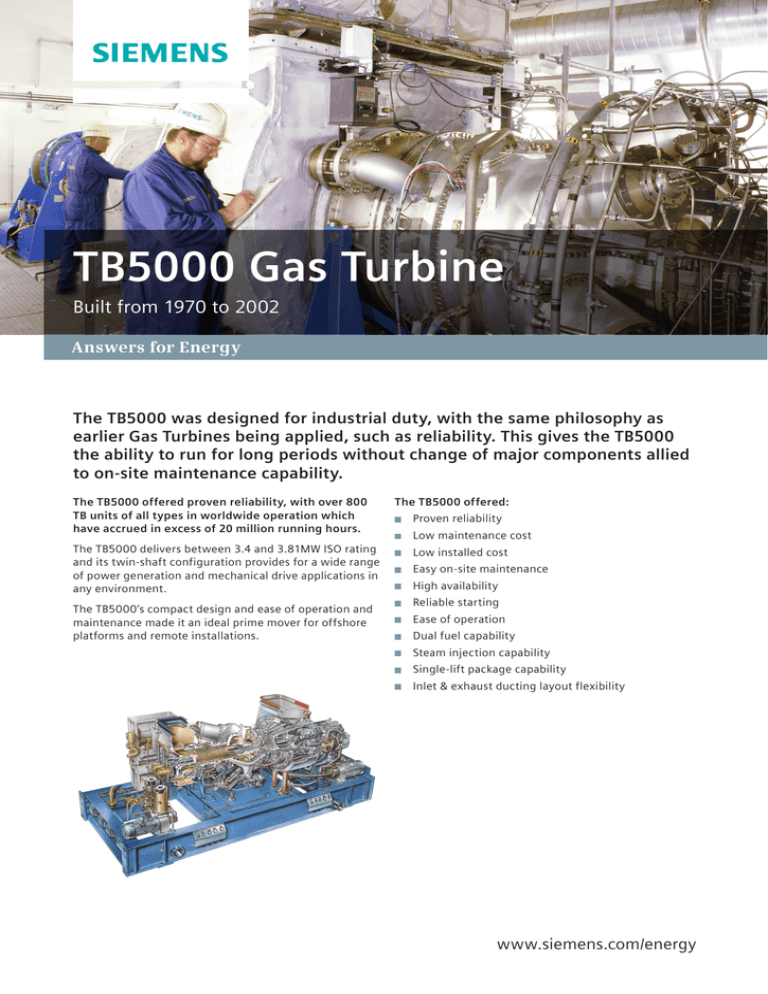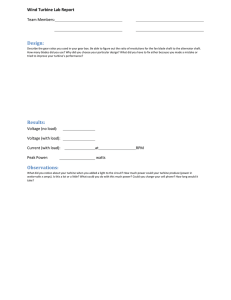
TB5000 Gas Turbine
Built from 1970 to 2002
Answers for Energy
The TB5000 was designed for industrial duty, with the same philosophy as
earlier Gas Turbines being applied, such as reliability. This gives the TB5000
the ability to run for long periods without change of major components allied
to on-site maintenance capability.
The TB5000 offered proven reliability, with over 800
TB units of all types in worldwide operation which
have accrued in excess of 20 million running hours.
The TB5000 delivers between 3.4 and 3.81MW ISO rating
and its twin-shaft configuration provides for a wide range
of power generation and mechanical drive applications in
any environment.
The TB5000’s compact design and ease of operation and
maintenance made it an ideal prime mover for offshore
platforms and remote installations.
The TB5000 offered:
Proven reliability
Low maintenance cost
Low installed cost
Easy on-site maintenance
High availability
Reliable starting
Ease of operation
Dual fuel capability
Steam injection capability
Single-lift package capability
Inlet & exhaust ducting layout flexibility
www.siemens.com/energy
with automatic changeover form primary to secondary
fuel possible across the entire load range.
The two-stage power turbine, with externally air-cooled
discs, is aerodynamically coupled to the gas generator
and provides power for the driven unit. Control System
To maintain alignment between rotating and static
elements, the power turbine stator casing is attached to
the gearbox through air-cooled support struts within the
exhaust elbow. Compactness with rigidity is a feature of
the power turbine assembly.
Flexibility
Texaco‘s Tartan Field platform with 13 Siemens Gas Turbines
installed; five to drive generators, two for main oil line pump drive,
three to drive gas compressors and three to drive water injection
pumps. Exhaust heat from the gas turbines driving the generators
was recovered and used in the processing of the well gas.
Design Features
A heavy duty industrial gas turbine, the TB5000
offered the characteristics of high reliability and long
life associated with well designed turbo machinery.
The TB5000 is a simple-cycle unit which consists of a
12-stage subsonic axial-flow compressor, a two-stage aircooled overhung compressor turbine, four combustion
chambers and a separate two-stage power turbine. The
compressor features variable inlet guide vanes to modulate
airflow and assure fast easy start-up and maximum
efficiency under partial loads. The centre casing is split
horizontally along the centre line providing access to the
compressor with the minimum of dismantling.
The four reverse-flow tubular combustion chambers,
externally mounted around the forward face of the
centre casing assembly, are specially designed for long
life and are readily accessible for inspection purposes.
The flexible fuel system is capable of operating on a wide
variety of gaseous fuels including refinery gas, landfill
gas and high CO2 content as, as well as distillate fuel,
1*013 bar
14*7 psia
15 C
59 F
7*30 bar
105*8 psia
271 C
520 F
6*86 bar
99*5 psia
900 C
1625 F
The highly responsive TB5000 offered unmatched
reliability for base load electrical power generation
and mechanical drive, onshore and offshore. A version
of the TB5000 was also used as a prime mover in the
Nomad 5, a compact, self contained, mobile power
station designed to meet base load and peak electrical
demands up to 3.8MW.
The TB5000 is well suited for cogeneration and combined
cycle power applications. Using exhaust gas to generate
steam for process use or supplementary power
generation significantly increases the system efficiency.
Steam may also be used for injection into the TB5000 to
increase the power output which also reduces heat rate
and emissions. Options exist for emissions control by
primary injection; power enhancement up to 4.2MW
ISO by secondary injection and power enhancement
with emissions control using both injection systems.
A fully integrated Siemens controls package suitable for
all applications is available, offering high reliability and
incorporating features to enhance engine and systems
availability.
Options are available to provide control sequencing and
monitoring of driven equipment and auxiliaries used in
power generation, cogeneration and mechanical drive
applications. The controls package may also be extended
to cover data logging, plant supervisory control and
financial management of complex power systems.
2*43 psia
53*3 ata
663 C
2*43 bar 1225 F
53*3 psia
663 C
1225 F
A Siemens TB5000 gas turbine
driving a 3.3 MW generator at the
pharmaceutical works of the Boots
Company plc at Beeston, near
Nottingham. The exhaust from the
turbine was fed into a boiler which,
with the provision of auxiliary firing,
produced 60,000 lb/hr of process
steam at a pressure of 340 psig. The
installation achieved an efficiency
well over 74%.
Maintenance
Optional Equipment
The TB5000 has been designed for ease of on-site
maintenance thereby maximizing operating
availability and minimizing downtime.
A concept of standard optional equipment provides a
wide range of proven, pre-engineered equipment.
Modular fuel and lubricating oil systems are mounted
away from the hot parts of the engine. Accessibly and
conveniently located on the turbine base are all of the
cable and pipe connections.
Design features included:
On-or-off site maintenance capability
Horizontally split centre casing facilitates easy
inspection of the compressor rotor and stator blades
and turbine inlet support casing and bearings
Using standard roll-out gear, the gas generator is
easily removed from the turbine for blade inspection
and overhaul
Combustion chambers and fuel burners easily
accessible if servicing is required
Gas generator easily transportable by air in a custom
built container
Planned inspection intervals of 8000 fired hours, or
annually, with an intermediate inspection every third
year or 24000 fired hours and major inspection every six
years or 48000 fired hours, give low cost maintenance
and high availability (Note: these inspections are
designated A, B and C).
Servicing
The design of the gas turbine provides operators with the
facility to carry out at site blade inspection and servicing
of the unit or, at the operator’s choice, at a Siemens
approved Service Centre.
Standard roll-out gear enables the gas generator to be
simply removed from the turbine when blade inspection
is due, or when servicing is required. With the gas
generator removed, the rotating assembly is readily
accessible by removing the top half of the stator casing.
Combustion chambers and fuel burners are equally
accessible when servicing is required.
Standard output shaft speeds suit most available driven
machines. A direct drive speed of 7900 rev/min is suitable
for centrifugal pumps and compressors and with an integral
epicyclic or parallel shaft gearbox, shaft speeds within
the speed range of 1500 to 18,000 rev/min are provided.
Weights & Dimensions
Base Engine
Length - 19‘0“ (5790 mm)
Height - 8’0“ (2438 mm)
Width - 8‘0“ (2438 mm)
Weight - 30,000 lb (13,608 kg)
Generator Set
Length - 32‘0“ (9753 mm)
Height - 8’0“ (2438 mm)
Width - 8‘0“ (2438 mm)
Weight - 63,000 lb (28,577 kg)
Pump Set
Length - 26‘0“ (7925 mm)
Height - 8‘0“ (2438 mm)
Width - 8‘0“ (2438 mm)
Weight - 43,000 lb (19,505 kg)
Compressor Set
Length - 26‘0“ (7925 mm)
Height - 8‘0“ (2438 mm)
Width - 8‘0“ (2438 mm)
Weight - 57,000 lb (25,855 kg)
Normal Continuous Ratings
Performance
Altitude Correction Parameter
Power and Specific Heat Input v Speed
2000m
2500m
δ
1.000
Altitude
0ft
0.943
0.888
0.835
0.786
0.739
2000ft
4000ft
6000ft
8000ft
10000ft
δ
1.000
0.930
0.864
0.801
0.743
0.688
9980
Specific Heat
Input Btu/bhp h
0
9750
15
10500
11000
ISO Rating at 15 °C (59 °F) and Sea Level 4900.
BHP output shaft speed 7900 rev/min.
The performance figures given are with zero inlet and
exhaust duct and gearbox losses. Standard gearbox loss for
indirect drive is 1.5%.
30
11500
45
12000
Ambient Temp °C
1500m
5000
1000m
4000
500m
60
3000
0m
Power Output Parameter bhp/δ
Altitude
13000
2000
14000
15000
3000
4000
5000
6000
7000
8000
9000
Power Turbine Speed rev/min
4000
Specific Heat Input is drawn for an ambient temperature of
15°C but is approximately correct for other temperatures.
Direct drive - no output gearbox
Combined Heat & Power Systems
3000
Power Output Parameter bhp/δ
5000
ISO Rating 4900 BHP
-10
0
0
10
20
20
40
30
60
40
80
60 °C
50
100
Generator Drive
120 °F
ISO Rating 4900 BHP
5000
Temperature
Direct drive - no outputAmbient
gearbox
No
48
Co
nti
nu
4000
46
ou
sR
ati
ha
Ex
44
ng
3000
°C
0
50
re
40
38
2000
0
0
40
34
0
0
36
34
0
32
Approximate Region of IGV Change -Over
30
0
38
0
36
0
0
0
32
34
0
30
0
40
1000
0
0
44
36
δ
0
48
46
lb/s
42
Flow
38
t
aus
Exh
ass
M
Gas
0
32
Zero Loss Power Output bhp/δ
0
tu
ra
pe
42
0
30
Since the exhaust gasses are rich in unconsumed oxygen, auxiliary
firing can be employed to increase the heat available by a factor of
up to four or five to one depending on application.
m
Te
Overall thermal efficiencies ranging from 55% to 90% are obtainable
when using a gas turbine as the single power and heat source in an
integrated manufacturing process. The curves show the variation of
exhaust gas mass flow and temperature at sea level and different
ambient temperatures.
52
as
tG
Exhaust temperatures and Mass Flows are typical of current
production engines.
al
us
Inlet and exhaust ducting losses have not been debited. Power
turbine speed 7950 rev/min.
rm
-20
-10
0
0
20
10
40
20
60
30
80
40
100
50 °C
120 °F
Ambient Temperature
Published by and copyright © 2013:
Siemens AG
Energy Sector
Freyeslebenstrasse 1
91058 Erlangen, Germany
Siemens Energy, Inc.
4400 Alafaya Trail
Orlando, FL 32826-2399, USA
For more information, please contact
our Customer Support Center.
Phone: +49 180 524 70 00
Fax:
+49 180 524 24 71
(Charges depending on provider)
E-mail:support.energy@siemens.com
www.siemens.com/energy
Energy Service Division
LCN 2013 - F33.18 LN
Printed on elementary chlorine-free
bleached paper.
All rights reserved. Trademarks mentioned in
this document are the property of Siemens AG,
its affiliates, or their respective owners.
Subject to change without prior notice.
The information in this document contains
general descriptions of the technical options
available, which may not apply in all cases.
The required technical options should
therefore be specified in the contract.



